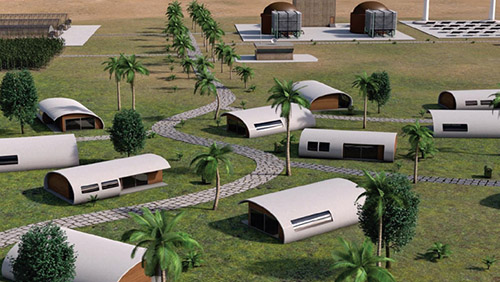


When Israeli green-construction expert Victor Haym Hajaj was recruited in 2012 to help build housing for 1 million refugees of the civil war in Congo, he had no problem building fast, affordable, earthquake-proof houses, but soon discovered there was no supporting infrastructure to provide water, food or energy.
He decided to create his own.
In 2017, he and Jonathan Haran founded The Sustainable Group. Their flagship project is Village in a Box, a holistic, residential, renewable energy-based infrastructure system to provide off-grid communities with environmentally friendly affordable housing and clean sustainable solutions for water, food, energy and waste treatment.
A proof-of-concept Village in a Box, with 200 homes, is now under development in the Negev desert town of Mitzpeh Ramon.
“I fell in love with the idea because it represents a big hope for humanity,” Haran told us. “Our aim is to build a better future without hurting the environment.”
At the Paris Air Show in June, Israeli company Eviation Aircraft unveiled its electric plane, a revolutionary emission-free plane that could usher in a new era of quieter, cleaner and more cost-effective flying.
Called Alice, the streamlined plane seats nine passengers and is planned to cruise at a speed of 260 knots for a range of up to 650 miles.
The plane, designed to reduce operating costs stemming from fuel and oil, is undergoing flight tests and could be available for commercial use as soon as 2022. Its first customer reportedly is Cape Air. In September, Eviation was merged into Clermont Aerospace of Singapore.
According to the International Civil Aviation Organization, 4.3 billion people traveled by air in 2018. That’s a major cause of pollution. Let’s hope the era of electric planes is about to commence.
Climate change is decimating coral reefs all over the world, and that’s bad news for fish life. Twenty-five percent of fish make their home in these vital living structures.
Now, however, Israeli scientists have figured out a way to print colorful new corals using a 3D printer and sustainable bioplastics.
The new artificial reefs, designed to accurately mimic natural coral, were created by researchers from Ben Gurion University of the Negev, and attached to a natural reef in the Red Sea, near Eilat.
Surprisingly, the fish seemed to like some of the colored artificial designs more than the natural ones.
Self-driving cars may be just around the corner, but there is one area of car development that has barely changed in over 100 years, according to Daniel Barel, CEO of Israeli automotive startup Ree—the way our cars are manufactured and designed.
No longer. Barel’s company plans to fundamentally change how vehicles are built. REE has invented a modular platform that looks a bit like a hoverboard, which houses the car’s major components—including brakes, thermal systems, motor and drivetrain—right next to the wheels.
The company emerged from stealth mode in the summer, and is already collaborating with Mitsubishi, Toyota’s truck subsidiary Hino Motors, auto-parts manufacturers Musashi Seimitsu, Linamar and Tenneco and semiconductor leader NXP.
By Nicky Blackburn/Israel21C










